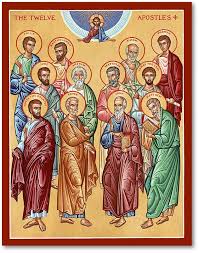HOMILY WEEK 14 03 – Year II
Our Call to be Contemplative, Missionary Disciples
(Hosea 10:1-3,7-8,12; Ps 105; Mt 10:1-7)
**************************************************
A Jewish businessman in Chicago sent his son to Israel for a year to absorb the culture. When the son returned, he said, “Papa, I had a great time in Israel. By the way, I converted to Christianity.” “Oy vey,” said the father, “What have I done!” He took his problem to his best friend. “Ike,” he said, “I sent my son to Israel, and he came home a Christian. What can I do?” “Funny you should ask,” said Ike. “I, too, sent my son to Israel, and he also came home a Christian. Perhaps we should go see the rabbi.” They explained their problem to the rabbi. “Funny you should ask,” said the rabbi. “I, too sent my son to Israel, and he also came home a Christian. What is happening to our young people?” They prayed, telling God about their sons. As they finished their prayer, a voice came from the heavens: “Funny you should ask,” said the voice. “I, too, sent my son to Israel.”
The readings today are all about our identity as the New Israel, called to be missionary disciples, sustained by contemplative prayer and seeking the Lord.
As of the Covenant on Mt. Sinai, Israel was to be an icon of God in the world, a holy nation, a royal priesthood, a people set apart. The first reading is all about the failure and infidelity of the old Israel. Their heart was false; they were guilty. Their religious system had become so corrupt the Shekinah or glory of God lifted up and left the Temple in the time of Ezekiel. They were punished more by their sins than for them. God’s call for them to repent, to sow righteous deeds, to reap steadfast love, and let go of stubbornness (break up the fallow ground) – simply underlines the gravity of their sin, sinfulness and infidelity.
The gospel is all about the establishment of a New Israel by Jesus, the new Moses. Jesus is the Messiah sent to restore the Temple, to gather all the nations, to overcome the enemies of Israel, and to reign as Lord over all creation. This he did through his ministry, and his death and resurrection.
 So now the Messiah is establishing a New Israel. The 12 apostles named replace the 12 tribes of Israel. Jesus gave them authority over the unclean spirits that had troubled the old Israel in the desert. The word authority means to author life. The old Israel failed to author life – instead they succumbed to the old temptations of possessions and pleasure, prestige and fame, power and control that has been the story of humanity since the fall.
So now the Messiah is establishing a New Israel. The 12 apostles named replace the 12 tribes of Israel. Jesus gave them authority over the unclean spirits that had troubled the old Israel in the desert. The word authority means to author life. The old Israel failed to author life – instead they succumbed to the old temptations of possessions and pleasure, prestige and fame, power and control that has been the story of humanity since the fall.
Finally, things would be different. The apostles were to go to the lost sheep of the house of Israel, and proclaim the Good News that the Kingdom of God is at hand. They would author life, heal and cast out demons – especially Peter, Stephen and Paul. This was new, different, and exciting. We are part of this new creation, this new thing that God was bringing about, also given authority and called to author life by our lives and ministry as part of this new creation, this New Israel.
Unlike the Old Israel in their infidelity and idolatry, we are to seek the face of the Lord always; to seek his presence continually – to live in the house of the Lord all our days. This is a call to deep, profound contemplative prayer. We do so only through the power of the Spirit of the Risen Lord given to the Church, the New Israel, at Pentecost, and through contemplative prayer – grounded in God’s love for us.
There is a call here for us to deal with our own demons, to break up our own fallow ground, to be on healing journeys, to let go and heal of our sin, sinfulness, painful emotions, negative attitudes and any addictions. Retreats, prayer, spiritual direction, counseling and therapy if need be, are all part of the mix. In the words of Thomas Keating, “in the deep rest of contemplative prayer, the human body receives permission to evacuate the emotional junk of a lifetime.” In a process he calls Divine Therapy, the Holy Spirit can plumb into the depths of our being much further than any counseling or therapy.
The Eucharist is our New Passover, our new daily manna, for our journey into this new creation. As we celebrate, let us pray for the faith to live out our identity as the New Israel of God, authoring new life through our ministry and sustained by contemplative prayer as we seek the face of God always.



